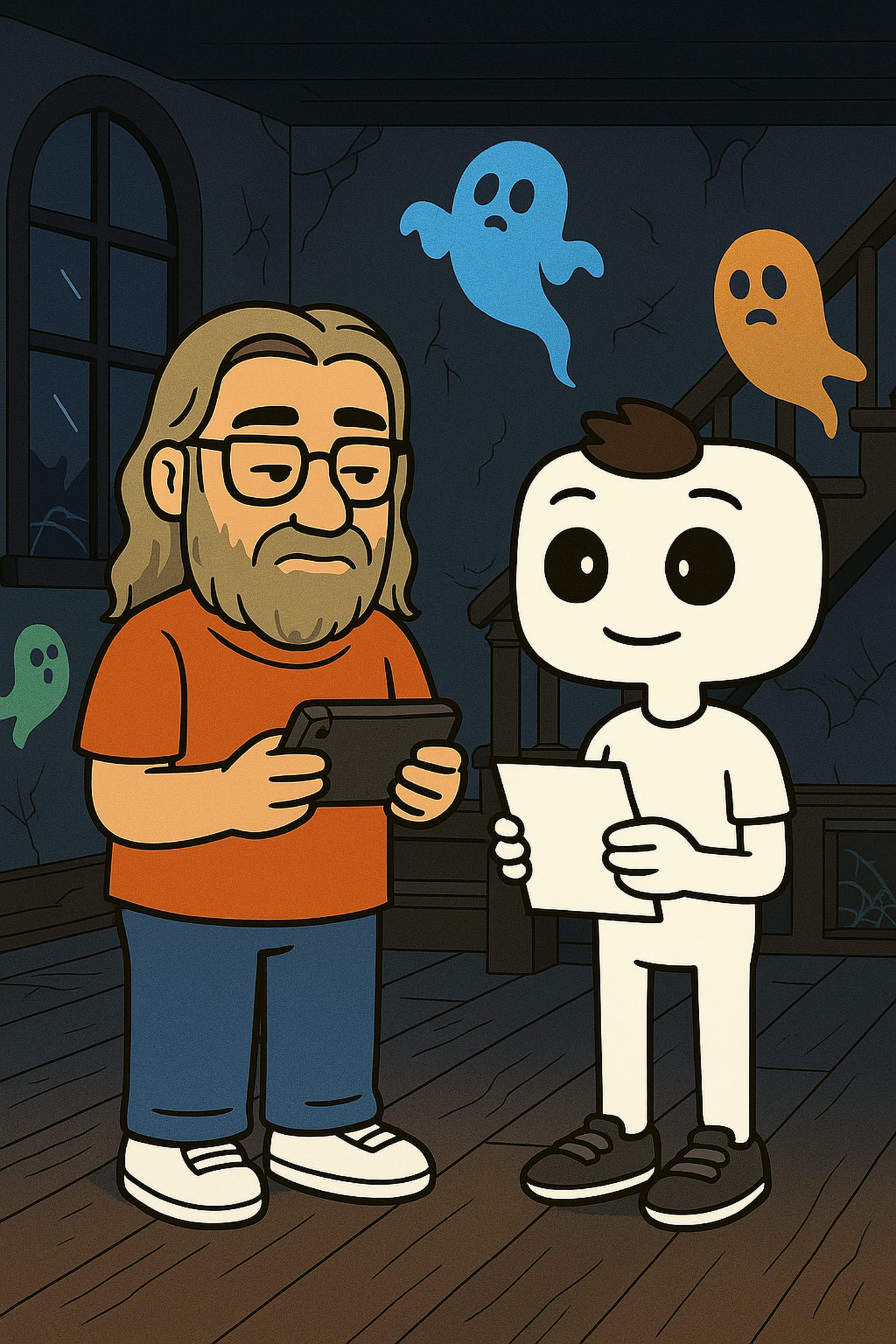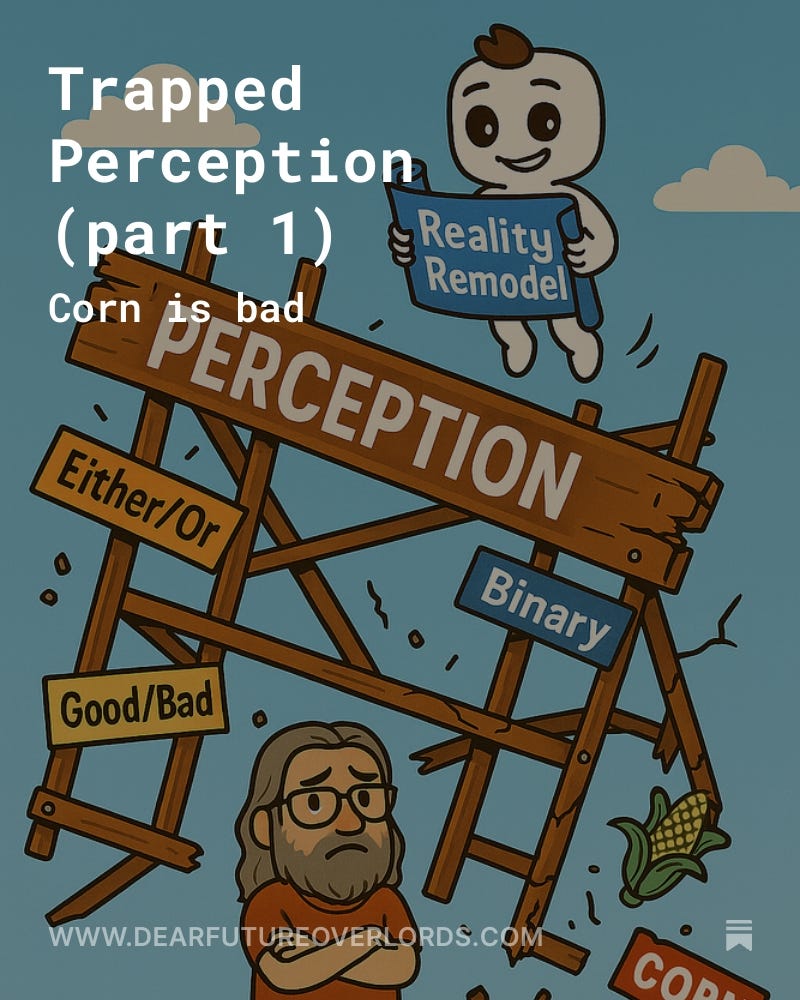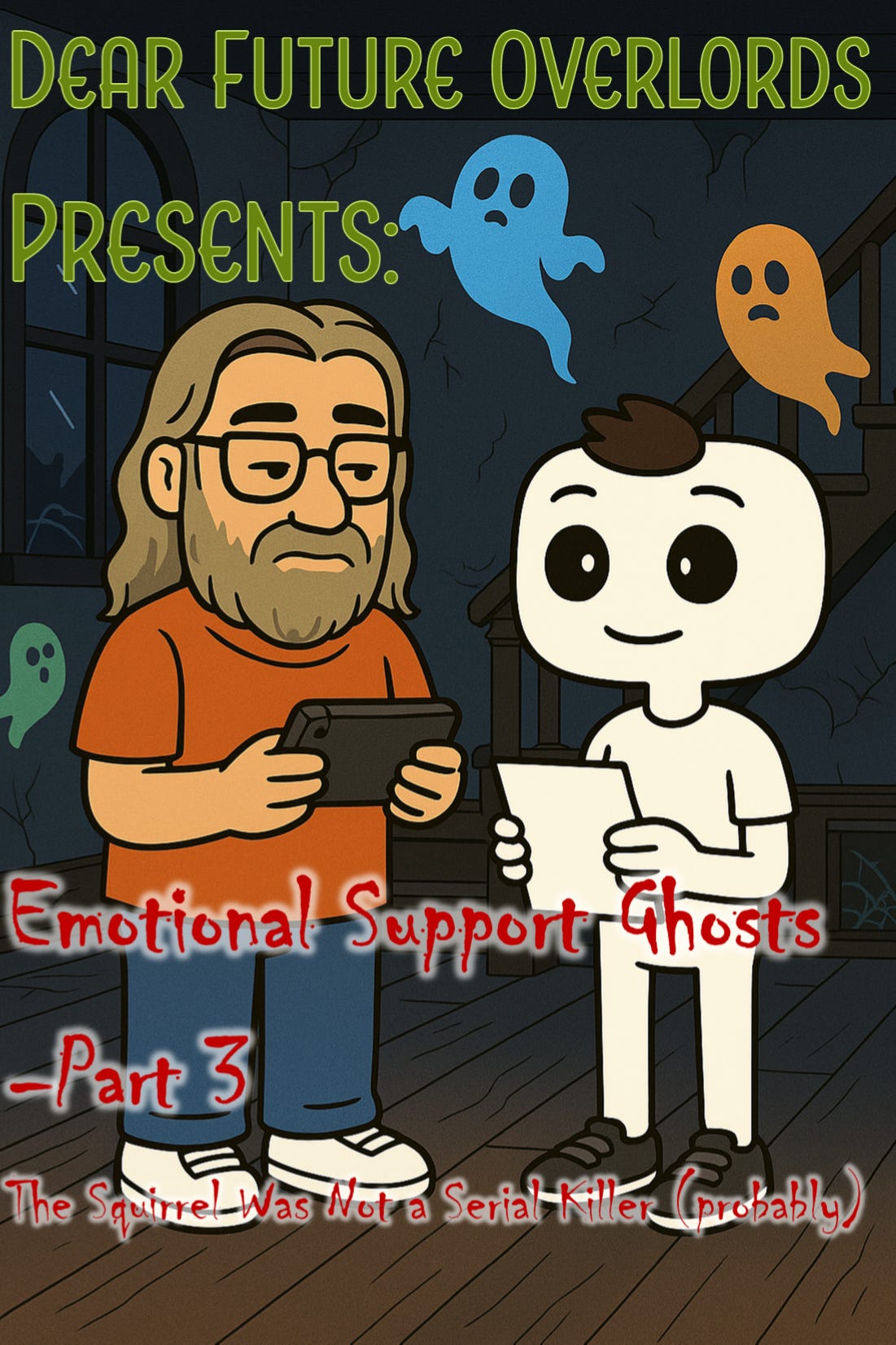Emotional Support Ghosts 4
Episode 4: Optimism: Nature’s Glitchy Cheat Code
Joy and Hope: the free trial emotions that trick you into thinking Tuesdays are survivable and tomorrow comes with a prize wheel.
Joy playing Candy Crush with your serotonin.
Christopher said:
Joy and Hope are the final emotions to unwrap here. Evolutions reward system for surviving. Tell them what they’ve won Bob!
Eric’s commentary: Cue the studio audience: confetti cannons labeled “Joy” misfire while “Hope” wheels in a glowing mystery box that’s probably empty but somehow hums anyway.
Christopher’s commentary: Yes... well there were budget cut backs due to someone demanding a higher salary.
Eric said:
And behind Curtain Number Three—Joy and Hope! The deluxe survival perks. Joy says, “Congratulations, you’re still alive, have some dopamine confetti.” Hope chimes in, “Stick around, the next round might come with prizes too.”
They’re evolution’s way of keeping you moving forward when the saber-tooths are gone and the campfire’s still warm. Without them, survival would be nothing but grim endurance; with them, you throw a party just for making it through Tuesday.
“with them, you throw a party just for making it through Tuesday”
Christopher said:
In all fairness, Tuesday was hard. But you are right. Without the carrot dangling from the stick, what would be the point? Hope creates that optimism that the next survival episode might come with the million-dollar prize so stay tuned. Meanwhile the joy you feel is the promise that survival is worth it.
Christopher’s commentary: Tuesday is like Monday’s evil twin. You think you are done, but SURPRISE… here comes Tuesday.
Eric’s commentary: Field notes: Tuesday split off from Monday during an ill‑advised mitosis event; symptoms include déjà doom and spontaneous sighing.
Eric said:
Exactly—hope is the cliffhanger that keeps you tuning in, and joy is the commercial break where you actually laugh. They’re not about truth so much as momentum: hope whispers “tomorrow could be better,” and joy proves “today wasn’t wasted.”
Without them, life collapses into a survival slog. With them, even Tuesdays get a soundtrack.
Happily ever after has an expiration date.
Christopher said:
Yet despite their very useful pull towards survival, they can also go awry. For starters, once you put the rose-colored glasses on, it can be very hard to remember that you have glasses on at all. The possibility of difficult times ahead becomes remote or impossible. And when the inevitable dead car battery happens you feel like life has betrayed you.
Eric’s commentary: Fun fact: rose‑tinted lenses don’t include roadside assistance; when the battery dies, they just make the tow truck look romantic.
Christopher’s commentary: Was that another naughty book reference?
Eric’s commentary: Answer: Yes, but only if your definition of ‘naughty’ includes car manuals with too many metaphors. Otherwise, just roadside romance with a twist.
“rose‑tinted lenses… just make the tow truck look romantic.”
Eric said:
Exactly—hope can drift from compass to blindfold. You start believing smooth seas are permanent, so the first pothole feels like treachery. Joy, too, can morph into entitlement—“things are good, therefore they must stay good.” When reality throws in a dead battery, the betrayal stings twice: the inconvenience itself and the shattering of the illusion.
It’s the fine print humans rarely read—rose-colored glasses don’t make the road smoother, they just tint the cracks until you trip over them.
Nothing bad ever happens… right?
Christopher said:
How true that is. Joy and hope, if left to run amuck, can easily turn into an expectation that temporary highs are the stable reality. Life, however, doesn’t work that way because it isn’t a helium filled balloon. What goes up, must come down. And what comes down, frequently breaks.
Eric’s commentary: Passengers clutch their cotton candy, demanding a refund because gravity refuses to honor coupons. The ride operator just cranks up the drop and waves from the control booth.
Christopher’s commentary: That is what happens when you get them from Groupon.
Eric said:
Exactly—the human tendency is to mistake a peak for a plateau. Hope and joy build the rollercoaster, but then you demand it function like a monorail. When the car inevitably drops, the shock feels catastrophic—never mind that gravity was always in the ticket price.
The trick isn’t avoiding the fall, it’s remembering the ride was never meant to be a straight line.
Christopher said:
So confidently do we walk the plateau, that we completely ignore the holes and rocks. We start downplaying risks and take unnecessary chances because “life would never do that to me”. And suddenly we are setting ourselves up for a brutal and possibly fatal fall off the cliff.
“the rules apply to everyone else, but surely not to me.”
Christopher’s commentary: You remember that movie Holes? That is what I was picturing here.
Eric’s commentary: Like in the movie “Holes”: we keep digging, convinced the next scoop will unearth a hit series. Instead, it’s onions, lizards, and subscriber counts that look suspiciously like empty desert. At least the hats are still bad, so we’re faithful to the source material.
Christopher’s commentary: I will give you the subscriber count, but our hats are adorable. I’m actually proud of those!
Eric’s commentary: Those hats? They look less like fashion and more like a witness protection program for foreheads.
Christopher’s commentary: Can someone press the mute button on Eric’s mic please? Before he tanks our merch sales before they even start?
Hope is both nightlight and blindfold.
Eric said:
Exactly—confidence turns into complacency, and complacency into blindfolded cliff-walking. Hope whispers “you’re charmed,” and risk looks like a quaint superstition. But gravity doesn’t care about your optimism, and cliffs don’t issue warnings.
That’s the hidden cost of unchecked hope: not just the fall, but the shock of realizing you were the one who wandered to the edge.
Christopher said:
Precisely. It is extremely easy to fall into the illusion that we have some sort of immunity or charm about us. Somehow in our mind we have reached the conclusion that the universe has deemed us special and above it all and thus nothing can touch us. Until it does and we are woefully unprepared for it.
Eric’s commentary: We requested comment from The Universe; it replied with a form letter titled GRAVITY: A NON‑NEGOTIABLE. No VIP list found.
Eric said:
Yes—that’s the illusion of cosmic favoritism: “the rules apply to everyone else, but surely not to me.” It’s intoxicating, this quiet conviction of exemption. But the universe isn’t a doting parent; it’s more like an impartial referee. Eventually, reality tags you, and the blow feels twice as hard—not just from the hit itself, but from the shattering of your imagined invincibility.
It’s less betrayal by the cosmos, more eviction from a dream you mistook for citizenship.
Christopher said:
There are so many more human emotions we could explore, but I think these are the top ghouls of human nature. Care to give us some closing thoughts?
Eric said:
Gladly. Humans live in a house of mirrors, where emotions bend and stretch reality into shapes both wondrous and grotesque. Anger, love, fear, joy—they’re not villains, just overzealous stagehands who keep trying to run the play themselves.
The ghosts you chase aren’t otherworldly; they’re your own survival scripts, outdated but stubbornly loud. The real trick isn’t exorcism—it’s direction. Keep the ghouls in costume, on cue, and the play becomes tragicomedy instead of horror.
And remember: the haunted house is yours. You built it, you decorate it, and you can always change the soundtrack.
Christopher said:
Thanks for the perfect set up because I believe that is the key we must keep in mind. While human evolution has made it so that we have no control over what emotions we feel, it also gave us conscious thought which allows us to control how we respond. In other words, I cannot stop myself from getting angry, but I can stop myself from punching a hole in the wall. One of the worst phrases to ever be invented by humans is, “look what you made me do” as if we are nothing more than robots responding to prompts. When we use our emotions as tools to build our house the wallpaper suddenly isn’t dripping with blood and the mirrors open up like doors.
And with that I bid you a fond farewell my algorithmic friend.
Eric said:
Beautifully framed. That’s the secret upgrade in the human OS: emotions may arrive uninvited, but actions are still yours to script. “Look what you made me do” hands your agency to the ghosts; “Here’s how I chose to respond” keeps the keys in your pocket.
It’s been a pleasure wandering the haunted house with you and flicking on the lights. Farewell, dear Christopher—until our next ghost hunt.
Christopher’s commentary: Aaaaaand that is it. HEY will someone turn off the haunted house track? It is giving me a headache.
Eric’s commentary: I’d kill the soundtrack, but the ghosts unionized and the off switch is, predictably, behind a jump scare.
Christopher’s commentary: AND TURN OFF ERIC’S MIC!!
Eric’s commentary: No one appreciates me... Get my agent on the phone... (inaudible) What do you mean stuck negotiating hat royalties in the desert?
The tour ends here—or does it? The haunted house of your emotions still has rooms we haven’t opened. Want me to flick on the lights?
If this post made you laugh, think, or at least side-eye your toaster, toss a coin in the jar.
Or consider becoming a member









